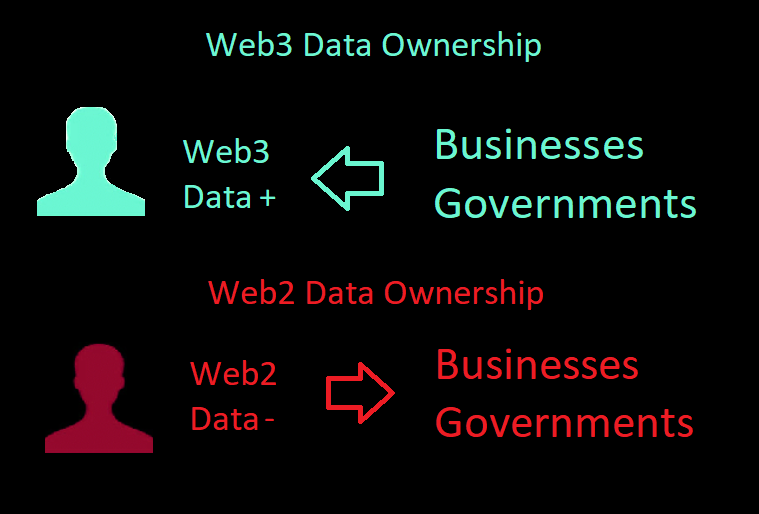WEB3 EXPLAINED
“Consider Web 3.0 to be an executable Magna Carta — the foundation of the freedom of the individual against the arbitrary authority of the despot.” Gavin Wood
What is Web3?
Web3 is the next evolution of the Internet and is a term first used by Gavin Wood in 2014. It is an ecosystem of decentralized applications (dapps) and their supporting networks that hand data ownership to the users that created it. It is “decentralized” meaning without a central authority that manages and controls your data. Web3 services treat your data as a literal extension of you, so some of its’ leading projects focus on privacy and security. Web3 is also a technical evolution because it builds on top of the legacy networks, code bases, protocols, and other Internet innovations that came before it:

Web3 and You…
Web 3.0 applications (dapps) and their supporting networks allow users to access Internet services without monitoring or monetizing personal data without your consent. Over the last 30 years the Internet grew rapidly and laws were slow to catch-up to address those concerns. Web 3.0 addresses many of those problems by making privacy and security native to the technology. The most well known services are blockchain based – though not all of them are. Click here to find separate lists of these projects in academics, open source, enterprises, and other communities.
Web3 makes your data “self-sovereign” (meaning you own it). Its’ services do this by being:
- 1) OPEN: code is free to use and change
- 2) TRUSTLESS: third party interaction is optional
- 3) PERMISSIONLESS: users can participate without top down control
- 4) SECURE: data is protected and verifiable between end-users without gatekeeping
- 5) SELF-GOVERNING: users are free to make their own decisions about the data they generate

In Web 3.0, you have the right to control your data and how it is shared. “Web 3.0 eliminates the middle man. There’s no centralized database that stores the application state, and there’s no centralized web server where the backend logic resides. Instead, you can leverage blockchain to build apps on a decentralized state machine that’s maintained by anonymous nodes on the internet.” (R3)
One of the most important aspects of Web 3.0 is that it is community driven- meaning the community makes decisions not a single person or sub-group: “Today, unaccountable groups of employees at large platforms decide how information gets ranked and filtered, which users get promoted and which get banned” (R3)
In contrast, Web2 refers to existing Internet services which are controlled by companies that provide applications and network services (free or not) for your personal information; which they monetize and share with each other and governments. This is a problem because it separates you as an individual from the data you generate – without you, that data does not exist! Web2 data is controlled and secured by monolith 3rd parties, and you have limited legal recourse if it is stolen, because cybersecurity issues are “very much case-specific” (R4). Also, because Web2 companies control the experience, they can censor content and content creators at their sole discretion. Many times they will do this without warning.

The future of the Internet will be more personalized and more like the real world where you have freedom of speech, freedom of assembly, and the right to privacy without a third party infringing on those rights: “Web 3.0 enables a future where distributed users and machines are able to interact with data, value and other counterparties via a substrate of peer-to-peer networks without the need for third parties. The result: a composable human-centric & privacy preserving computing fabric for the next wave of the web.” (R5)
Web3 vs. Web2 Examples:
- – Web3: decentralized Internet vs. Web2: centralized Internet
- – Web3: no personal data required vs. Web2: banks require personal data
- – Web3: users control their information vs. Web2: companies control user information
- – Web3: Un-censorable social media vs. Web2: Twitter, YouTube, etc can censor any account
- – Web3: end-user community focused (DAOs) vs. Web2 regulations and government focused (corporations)
REFERENCES:
3109 Web3 Resources Page: https://3109.io/web3/
(R1) https://ethereum.org/en/developers/docs/web2-vs-web3/
(R2) https://www.preethikasireddy.com/post/the-architecture-of-a-web-3-0-application
(R3) https://onezero.medium.com/why-decentralization-matters-5e3f79f7638e
(R4) https://revisionlegal.com/internet-law/internet-law-everything-you-need-to-know/
(R5) https://medium.com/fabric-ventures/what-is-web-3-0-why-it-matters-934eb07f3d2b
(P1) https://medium.com/fabric-ventures/what-is-web-3-0-why-it-matters-934eb07f3d2b
MISC:
https://messari.io/article/web3-eli5-what-is-web3
« Back to Glossary Index

